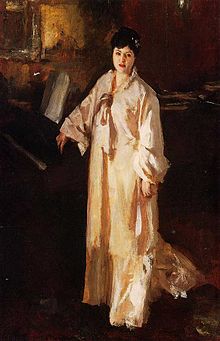You can help expand this article with text translated from the corresponding article in French. (December 2013) Click for important translation instructions.
|
| Judith Gautier | |
|---|---|
 | |
| Born | 25 August 1845 Paris, France |
| Died | 26 December 1917(1917-12-26) (aged 72) France |
| Occupation | Poet, novelist |
| Nationality | French |
| Genre | Poetry, historical literature |
| Spouse | Catulle Mendès |
| Partner | Richard Wagner (1876) |
Judith Gautier (25 August 1845, Paris – 26 December 1917) was a French poet, translator and historical novelist, the daughter of Théophile Gautier and Ernesta Grisi, sister of the noted singer and ballet dancer Carlotta Grisi.

She was married to Catulle Mendès, but soon separated from him and had a brief affair with the composer Richard Wagner during the late summer of 1876. She collaborated with Pierre Loti, the famous novelist, in writing a play, La fille du ciel (1912; English, The Daughter of Heaven), translated and produced under their personal supervision at the Century Theatre, New York City. She was an Oriental scholar and her works dealt mainly with Chinese and Japanese themes. Her translations were among the earliest to bring Chinese and Japanese poetry to the attention of modern European poets. She was a member of the Académie Goncourt (1910–17).
Works

- Le livre de jade (Paris, 1867) (extended edition Paris, 1902)
- Le Dragon Impérial (1869)
- L'Usurpateur (1875)
- Isoline et La Fleur-Serpent (1882) (translated by Brian Stableford as Isoline and the Serpent-Flower (2013), ISBN 978-1-61227-152-1)
- La Reine de Bangalore (1887)
- Les Princesses d'Amours (Paris, 1900)
- Le Collier des Jours (Paris, 1902)
- Le Paravent: De Soie et D'Or (Paris, 1904)
- L’Avare Chinois, an adaptation of a Yuan zaju Khan thsian-nou by Zheng Tingyu (Paris, 1908)
- Mémoires d'un Éléphant Blanc (The Memoirs of a White Elephant), illustrations by Alphonse Mucha (children's book)
Further reading
- Knapp, Bettina L. (2004). Judith Gautier: Writer, Orientalist, Musicologist, Feminist. Hamilton.
- Richardson, Joanna (1987). Judith Gautier: A Biography. New York: F. Watts.
References
- ^ Daniel Coit Gilman, ed. (1902). "Gautier, Judith". New International Encyclopedia, Volume VIII. New York: Dodd, Mead and Company. p. 161. Retrieved November 18, 2018.
- "Loti-Gautier Play at Century Theatre", The New York Times, October 13, 1912.
- Tian, Min (2018-11-27). The Use of Asian Theatre for Modern Western Theatre: The Displaced Mirror. Springer. ISBN 978-3-319-97178-0.
- Gallica.bnf.fr
External links
- Works by Judith Gautier at Project Gutenberg
- Works by or about Judith Gautier at the Internet Archive
- Works by Judith Gautier at LibriVox (public domain audiobooks)
